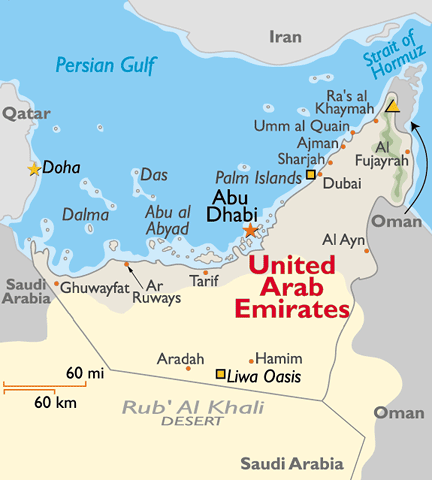Artifacts uncovered in the UAE show a history of human habitation and transmigration spanning back 125,000 years. The area was previously home to the Magan people known to the Sumerians, who traded with both coastal towns and bronze miners and smelters from the interior. A rich history of trade with the Harappan culture of the Indus Valley is also evidenced by finds of jewellery and other items and there is also extensive early evidence of trade with Afghanistan and Bactria as well as the Levant.

Through the three defined Iron Ages and the subsequent Hellenistic Mlieiha period, the area remained an important coastal trading entrepôt. As a result of the Ridda Wars, the area became Islamised in the 7th Century. Small trading ports developed alongside inland oases such as Liwa, Al Ain and Dhaid and tribal bedouin society co-existed with settled populations in the coastal areas.
A number of incursions and bloody battles took place along the coast when the Portuguese, under Afonso de Albuquerque, invaded the area. Conflicts between the maritime communities of the Trucial Coast and the British led to the sacking of Ras Al Khaimah by British forces in 1809 and again in 1819, which resulted in the first of a number of British treaties with the Trucial Rulers in 1820. These treaties, including the Treaty of Perpetual Maritime Peace, signed in 1853, led to peace and prosperity along the coast and supported a lively trade in high quality natural pearls which lasted until the 1930s, when the pearl trade collapsed, leading to significant hardship among the coastal communities. A further treaty of 1892 devolved external relations to the British in return for protectorate status.
A British decision, taken in early 1968, to withdraw from its involvement in the Trucial States, led to the decision to found a Federation. This was agreed between two of the most influential Trucial Rulers, Sheikh Zayed bin Sultan Al Nahyan of Abu Dhabi and Sheikh Rashid bin Saeed Al Maktoum of Dubai. The two invited other Trucial Rulers to join the Federation. At one stage it seemed likely Bahrain and Qatar would also join the Union, but both eventually decided on independence.
Today, the UAE is a modern, oil exporting country with a highly diversified economy, with Dubai in particular developing into a global hub for tourism, retail, and finance, home to the world's tallest building, and largest man-made seaport.
